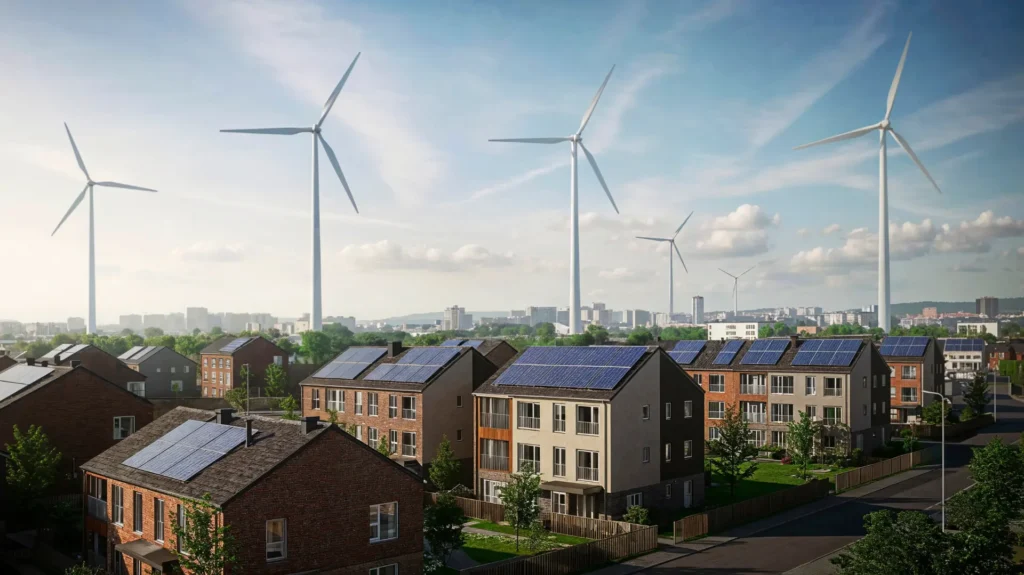At IFRSLAB, we believe this isn’t a signal of regression—it’s a call for recalibrated, smarter ambition. The challenge now is less about setting net-zero targets and more about confronting the granular, system-level changes required to achieve them.
The Energy Transition: Ambition vs. Execution
In 2024, the world added over 500 GW of renewable capacity, and projections by the International Energy Agency (IEA) indicate that by 2030, over 5,500 GW will be installed globally. China alone is expected to contribute 60% of this expansion, while the EU pushes forward with policies aimed at achieving 42.5% renewable energy share by the decade’s end.
Despite these figures, renewable energy still faces fundamental roadblocks:
- Grid integration challenges for intermittent sources like wind and solar.
- Permitting delays and regulatory fragmentation in key markets.
- Inadequate storage and transmission infrastructure.
- Supply chain vulnerabilities for critical materials (e.g., lithium, cobalt).
This divergence between ambition and execution requires a closer look at how sustainability strategies are financed, managed, and governed—particularly in emerging markets where institutional capacity remains underdeveloped.
The Finance Imperative: From Pledges to Pipelines
One of the most significant outcomes of COP29 was the global commitment to mobilize $300 billion annually by 2035 for climate-vulnerable and developing nations. This level of finance is intended to accelerate renewable energy deployment and resilience measures. However, turning this financial ambition into credible pipelines of bankable projects is a complex task.
Here’s where ESG-focused investment strategies and climate risk governance frameworks must evolve. Investors are increasingly seeking:
- Transparent project screening aligned with sustainability taxonomies.
- Verified emissions-reduction potential tied to capital deployment.
- Long-term climate resilience in infrastructure and supply chains.
Beyond Power: Renewables in Transport and Industry
Energy systems are becoming more electrified—but fossil fuels remain dominant in hard-to-abate sectors like aviation, shipping, and heavy industry. The shift to drop-in alternatives such as Sustainable Aviation Fuel (SAF), renewable diesel, and bio-methanol is a crucial part of the renewables story in 2025.
Here’s the strategic pivot: success will depend not just on technological readiness but on how companies manage feedstock sourcing, lifecycle emissions, and policy alignment.
For example:
- SAF scalability depends heavily on waste-to-fuel innovation and feedstock diversification.
- Marine fuel decarbonization is reliant on green hydrogen derivatives—an area still in nascent commercial phases.
- Public-private partnerships are critical for de-risking first-mover projects.
IFRSLAB works with clients across energy, manufacturing, and logistics sectors to map decarbonization pathways that integrate renewables into both operations and product lifecycles.
Strategic Outlook: Transition Readiness Must Be Measured
The challenge with renewables is no longer just about whether we transition—it’s about how ready we are to transition. Businesses must start answering:
- Are our supply chains equipped to absorb the volatility of energy input shifts?
- Do our emissions baselines account for renewables integration opportunities?
- Are we tracking renewable share in procurement, operations, and transport, beyond compliance reporting?
This is where carbon accounting, GRI-based ESG reporting, and science-based targets converge to offer a meaningful picture of progress.
The IFRSLAB Perspective
At a time when the energy transition narrative is being reshaped by real-world friction, companies must respond with realism, resilience, and rigor.
The renewables challenge of 2025 is not a step back—it is a recalibration. One that demands:
- Transparent frameworks
- Measurable progress
- Multi-sector innovation
- And credible governance
Whether you’re a multinational recalibrating your decarbonization strategy or an SME looking to future-proof operations, IFRSLAB can help translate global energy goals into tailored, actionable sustainability strategies.





